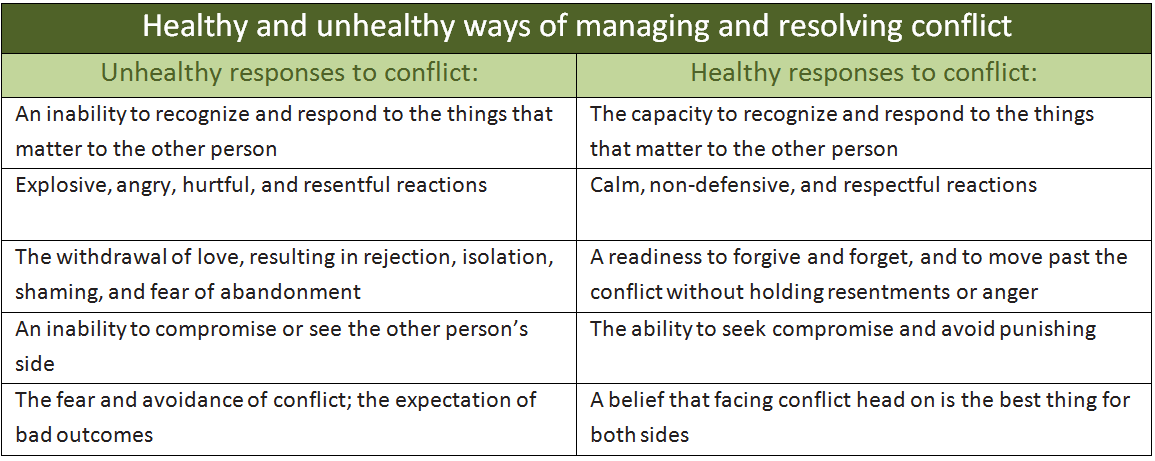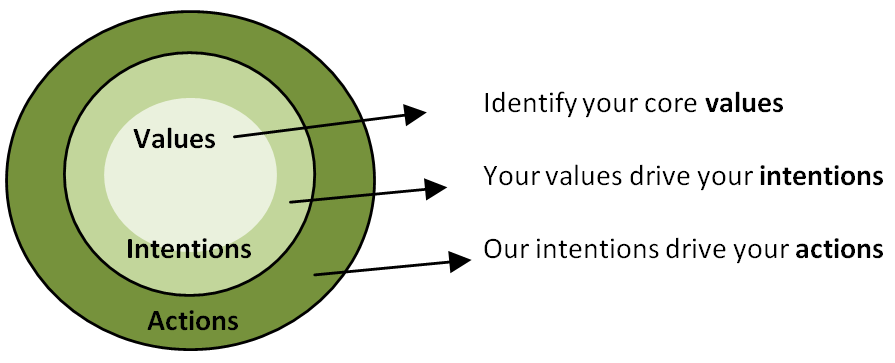Character cannot be developed in ease and quiet. Only through experiences of trial and suffering can the soul be strengthened, vision cleared, ambition inspired and success achieved.
Helen Keller
Self-Application
You must be in touch with your own values and feelings. If you don’t know how you feel or why you feel that way, you won’t be able to communicate effectively or resolve disagreement. You’ll have a hard time communicating with others and being able to identify what’s really troubling you. You must be able to manage your emotions and regulate your stress. If you want to get past the conflict, you need the ability to stay balanced, focused and in control, no matter what challenges are in front of you. If you are unable to maintain control of yourself, you will become overwhelmed in conflict situations and unable to respond in healthy ways.
The ability to successfully resolve conflict depends on your ability to:
Stress interferes with the ability to resolve conflict by limiting our ability to:
If you can’t come to an agreement; agree to disagree. It takes two people to keep a disagreement going. If a conflict is going nowhere, you can choose to disengage and move on.
There are three truths: my truth, your truth and the truth.
Chinese Proverb
Coaching Application
The key to managing conflict is through emotional awareness, knowing what you are feeling and why.
It’s the ability to identify and express what you are feeling from moment to moment and to understand the connection between your feelings and your actions. Emotional awareness also allows you to understand what others are feeling and to empathize with them. Explore with your client ways in which they may gain emotional awareness. They may need to reframe their perspective to understand the underlying needs at the core of their response to conflict. Without an awareness of how they are feeling, it will be impossible to understand their behavior, manage their emotions and actions, and accurately determine the wants and needs of others.
Emotional awareness will help your client:
Reflection and visualization are good techniques to use with your clients to help them gain the ability to recognize their moment-to-moment emotional experiences and the ability to handle their emotions without becoming overwhelmed or out of control.
Help your client to understand their actions. You may do this by identifying Integrity Circles:
Our values are at our very core. They are the things most important to us, the characteristics and strengths we find valuable. Our intentions are derived from our values. Our intentions drive our actions. Our actions may stray from our values, and yet what others judge us by are our actions. It’s important to understand our actions when we misbehave and work backwards to the core of our values and needs. Ask your client the following questions:
- Think of a time in which you behaved in a way that was different from what you intended. What happened?
- What was the disconnect between your behaviors and values?
- How do you think the other person perceived you?
- How do you think you made them feel?
- What did you learn from it?
The reflection questions below may help your client to move past conflict to opportunity. This may be done through role-play, self-reflection and/or dialogue.
Reflection Questions
- How do you define conflict?
- Is the conflict work risking a relationship?
- How important is the relationship?
- Can I make a difference?
- What else can I learn?
- Am I listening to understand or listening to come up with my next response?
- Can I listen more deeply instead of blaming?
- What else could I ask to understand better?
- Do I truly understand the way others see the situation?
- Am I missing any vital information?
- What emotions am I allowing to get in my way of resolving the conflict?
- Can I see the opportunity at the end of the conflict?
If you talk to a man in a language he understands, that goes to his head. If you talk to him in his language, that goes to his heart.
Nelson Mandela
References
Jeanne Segal, Ph.D., Melinda Smith, M.A., and Lawrence Robinson, “Emotional Awareness: Recognizing and Harnessing the Power of Your Emotions,” Helpguide.org, September 2012,
Jeanne Segal, Ph.D., Greg Boose and Melinda Smith, M.A., “Conflict Resolution Skills: Building the Skills That Can Turn Conflicts Into Opportunities”, Helpguide.org, January 2013, http://www.helpguide.org/mental/eq8_conflict_resolution.htm
Mark Gerzon, Turning Conflict Into Opportunity: How Successful Leaders Transform Differences into Opportunities, Management Forum Series, April 11, 2007
Nancy Lewis and Aleta Norris, Integrity Circles, Living As A Leader®, copyright 2013
Merriam-Webster Online Dictionary, www.merriam-webster.com/


